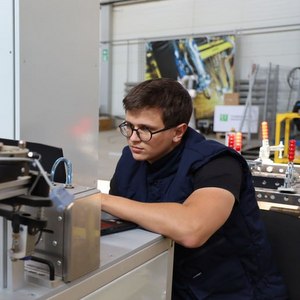Within the collaboration, the Robotics Training Centre started its work, and two training programs on interacting with collaborative robots have been developed. Cobots are easy to operate, so the maximum training period is only 5 days. During this time, students will receive all the necessary knowledge and skills to interact with collaborative robots: they will learn how to connect, program and maintain cobots, and understand the product line of one of the leading manufacturers of robotic devices Dobot, as well as study technologies ensuring safe interaction of robots in close proximity to humans, and practice the theoretical knowledge they have gained.
Anyone who has higher technical education and wants to learn how to interact with robots, both specialists from enterprises and master’s degree students from universities, can take the training.
The training programs have been developed by Samara University’s teachers, together with practitioners who implement, configure and repair robots every day: we mean specialists of Tesvel LLC. The company implements projects on robotization of technological processes for such manufacturers as UEC, Rostselmash, SIBUR, Metalloinvest, Tyazhmash. Besides, Tesvel is the official distributor of Dobot in Russia and has its own dealer network for sales of collaborative robots.
On the part of Samara University, the Robotics Training Centre is supervised by the Advanced Aerospace Engineering School “Integrated Technologies in Development of Aerospace Engineering”, which is the University’s structural unit. The AAES was established in 2022, under the Federal Project of the Ministry of Science and Higher Education of the Russian Federation “Advanced Engineering Schools”, aimed at training engineers of new formation, who are able to deal with knowledge-intensive and multidisciplinary technologies.
Professor Dmitry Antipov, Doctor of Technical Sciences, Head of Samara University’s Department of Aircraft Production and Quality Management in Mechanical Engineering, believes that robotization of production processes will grow, therefore profile specialists will be in great demand.
“Today, competitiveness of manufacturing enterprises may be ensured only by increasing labour productivity and reducing labour-intensity of technological operations. This requires automation and robotization of production processes and creation of robotic production cells. Specialists engaged in programming and operating such robotic systems will not only be in demand, but also high-paid. In the next five years, robotization of production processes will grow exponentially,”shared Samara University’s lecturer his opinion.
He also indicated where the roboticists would be awaited,
“Specialists in programming and operating robots have great prospects in large industry enterprises – market leaders, as well as in small- and medium-sized enterprises aimed at developing and continuously improving their efficiency. The specialists will be in demand at most manufacturing enterprises in industries, such as mechanical engineering, aviation and rocket engineering, as well as in the food industry, etc., since robotic systems will replace repetitive labour-intensive high-precision operations requiring high speed, as well as complex operations in areas with arduous working conditions.”
Learn more about the training programs offered by the Robotics Training Centre.
